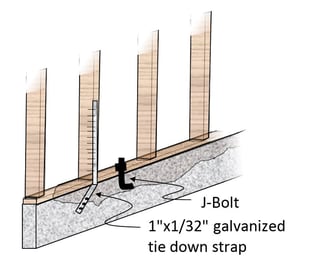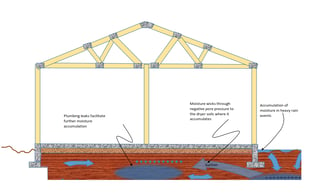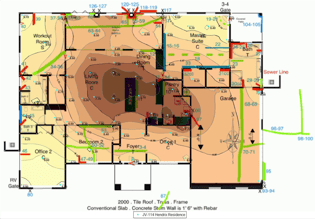Foundation Repair Frequently Asked Questions
Arizona Foundation Repair™ Experts!
Here are a few of the questions we have received regarding foundation repair.
We've compiled a list of the more common questions we get surrounding foundation repair. At Arizona Foundation Solutions, our repair plans are always rooted in science and not the need to make a commission. To learn more about our Forensic Engineered Reports, click HERE.
What are signs of foundation problems?
There are many signs, sloping floors, cracks in floors, walls, doors pinched, windows pinched and many others. The video to the right has visual examples of what a foundation problem can look like.
My home has a foundation crack... How serious is it?
Cracks may be signs of serious foundation movement… or perhaps not. Cracks are one of 16 possible things to observe, analyze and compile. This should be done under the guidance of a licensed professional engineer. To learn more about what should be included in a foundation inspection, click here.
What will happen if I don’t fix the crack in my home's foundation?
Perhaps nothing…… however the best predictor of future performance is past performance. Few homes experience structural failure…. However that is usually not the pertinent issue… serviceability failure… functionality ….is usually the most common issue that affects a home’s value and its livability.
How do I know if the suggested foundation repair is the right one?
As a layperson it is very difficult. We believe in transparency, which is why I publish a series of blogs on how to arrive at data driven conclusions for foundation repair. More importantly, you should not rely on a foundation repair person's conclusions, but rather the opinion of a licensed professional engineer who is professionally trained in soil mechanics and structural mechanics.
Learn more about making sure the right repairs are done on your home: https://www.foundationaz.com/blog/foundation-repair-doing-things-right-vs.-doing-the-right-things
How can I know if what my foundation repair salesmen is telling me is true?
You don’t. Foundation Repair salesmen are wonderful at sharing, advising, communicating what the professional engineer has recommended, and other valuable functions… however they are not qualified to diagnose, analyze, or recommend foundation repairs. Learn more about protecting yourself from unscrupulous foundation repair salesmen by clicking here.
Will fixing grading and drainage take care of all future foundation problems?
We always recommend proper grading and drainage to optimize foundation performance. Not only that our reports always include specific designs for that improvement as opposed to vague words that are hard to put into action. (see link)
One thing to remember is that if you have moisture accumulation under your foundation, only controlling moisture on the perimeter of the home may in fact exacerbate the differential moisture if it has already accumulated in the center portions of a home. To learn more about how landscape drainage impacts your home's foundation, click here.
Why do so many houses have foundation issues?
All homes are built on many layers of soil that all react differently over time to moisture, pressure, plants, and many other factors. Think of the soil as a seven layer chip dip that is very dynamic over time.
Learn more about the different types of foundations here: https://www.foundationaz.com/blog/foundation-types
Can I re level my house myself?
Well you could try. Even if you are incredibly resourceful and succeed in re-leveling….. you will not have solved the cause of the problem…..in the soil below the house.
Is my handyman qualified to do foundation repairs?
Not likely. They might succeed in re-leveling… temporarily… temporarily because they will not have addressed the problems in the soil that caused the problems.
Is my realtor qualified to give an opinion on what a crack represents?
NO! Realtors are not experts in foundation repair and should never opine on cracks, jammed doors, jammed windows or other similar signs of stress.
Is my home inspector qualified to give an opinion on what a foundation crack represents?
NO! They can Identify signs of stress and recommend a licensed professional to evaluate.
Are you hiring a Home Inspector? Click HERE to learn more about what Homeowners need to know!
Can a foundation inspection be done right on the spot in one visit?
NO! There are many factors to observe, analyze, and weigh together to arrive objective data driven conclusions…. Including peer review and engineering oversight, that cannot be done in one visit (click here to learn more). Click HERE to learn more about Foundation Inspection Guidelines.
Should I have an engineer oversee my foundation investigation?
Yes! We feel that geotechnical engineers typically bring more value than structural engineers since most of the problems originate in the soil. Engineers bring 4-6 years of university training, years of apprenticeship under a tutelage of a professional engineer and must pass 2 very vigorous exams. In addition they are regulated by the state agencies who oversee their activities.
Learn more here: https://www.foundationaz.com/blog/on-site-immediate-evaluations
How much would it cost to fix my home's foundation?
Costs vary greatly. Each home should be evaluated carefully. Some may be in the tens of thousands of dollars…others may end up very little… or even zero if evaluated by an objective licensed professional engineer.
When should I consider fixing my foundation?
The best predictor of future performance is past performance. If the foundation has moved, it will likely continue to move. The sooner the repairs are done the longer they will show the test of time for future buyers…. And as Benjamin Franklin noted…. “A stitch in time saves nine”
Will insurance cover foundation repairs?
Almost all Insurance policies have an “earth movement clause” that effectively excludes foundation damage from earth movement.. convenient huh? If you can prove sudden and catastrophic failure from an event…. Pipe breaks, floods, etc, you might have a fighting chance of getting your claim paid. This is a good reason to establish a “baseline report” on your home to compare for insurance reasons in case you have an event that triggers a claim sometime in the future.
How do you fix foundation problems?
Once a fair, objective, data driven investigation yields recommendations from a licensed professional, underpinning for settlement or soil venting for expansive soil heave can be performed by a certified foundation repair trained specialist.
Having the right tools for the job is key: https://www.foundationaz.com/blog/foundation-repair-tools
Should I buy a house with foundation problems?
Most houses have some problem at one time or another. If there are no disclosures, it probably is a red flag. If the problems have been analyzed by a licensed professional engineer, and show that they have been repaired per their recommendation…. That gives much more confidence than no disclosure.
Will banks finance a house with foundation problems?
Not typically. There are 203K loans that can accommodate these types of repairs. In addition some select lenders will allow money to be held in escrow for foundation repairs.
Does foundation repair affect my home value?
If the foundation repairs were installed to an engineer’s recommendations, especially if they have performed well over time, we have typically have seen very little to no diminution of values.
Do you have to disclose foundation problems when you sell?
Yes! They are required in the “SPUDS” on every transaction. Some homeowners may choose to not disclose - what we call “the caulk and walk”- we are also called many times to be expert witnesses when the buyer sues the seller, agent and broker for failure to disclose.
Can you live in a house during foundation repairs?
Yes. We rarely find it necessary to recommend homeowners to move out during repairs.
How do I sell my house with foundation problems?
This can be tricky. You will likely pay a fear based premium on top of the actual costs. And cede control of the repairs to a buyer. A few select lenders will allow the funds from escrow to be held after the closing to pay for foundation repairs.
I found out I have expansive soils… what does that mean?
Everyone has heard of expansive soils, but few understand their significance. Expansive soils expand when wet and shrink when dried out. These expansions and contractions frequently cycle or accumulate, causing settlement or heave. If there is a structure on top, it will stress under those movements.
Learn more about Expansive Soil here: https://www.foundationaz.com/expansive-soil
What is a manometer survey?
A manometer survey is basically a floor elevation survey usually done with a manometer…. A water tank connected to a hose that is mounted on a stick with a ruler on it. It works better than a laser that depends on line of sight that is hard to work around lots of walls. Bear in mind that this is an essential tool but still only one of sixteen that should be included.
What can a manometer survey tell us? Find out here: foundationaz.com/blog/conducting-a-floor-elevation-survey-with-a-manometer
Will I have to repair the entire foundation?
Its possible but not likely. Most soil problems are localized with layering that is disrupted with dirt work of the developer. This disruption allows water to penetrate at various locations that differ at each location.
Should I do foundation repair before or after remodeling?
We strongly suggest that repairs be done before remodeling. The last thing you want is for your newly remodeled home to is for it to start exhibiting signs of stress.
Is my home going to move again after the foundation repair?
If repairs recommended by a licensed professional engineer are installed to his approval, those repairs are most likely to perform over time.
My home is 30 years old, how much more can the foundation really move?
Soil mechanics are complicated. Water moves below the surface in different ways for different reasons over time. We have seen many houses more than 30 years old show new signs of movement.
We have worked on everything from historic homes to newer homes (more than 8 years) and a few structures in-between! The historic Prescott Courthouse is among our favorite historic projects. Learn more here: https://www.foundationaz.com/blog/historic-prescott-courthouse-restoration
How do you know my home's foundation will continue to move?
The best predictor of future performance is past performance. Its hard to say if that rule always holds…. because as noted soils and soil movement is complicated. But it is generally a good rule.
How can you tell it wasn’t built this way?
This is part of a fair, objective and unbiased professional investigation. Most homes are not built level to begin with. by examining all 16 factors of a forensic investigation we can arrive at a data backed conclusion. For example if a low or high area has many signs of damage, it is usually interpreted as moving in those areas. Floor levels over time can gives more clarity.
On a scale from 1-10 how bad is my foundation?
This is a common pitch from foundation salesman who have no idea what they are talking about since there are no established foundation scales that use that measure. The Post Tensioning Institute gives tilt, and deflection allowables of 1% and L/360 respectively.
Don’t your engineers work for you? Wouldn’t that make you always want to recommend foundation repairs?
Licensed professional engineers who work for us have no incentives to recommend anything other than what the forensic evaluation yields for conclusions. Engineers are regulated by state agencies and takes their responsibilities seriously. Our engineers are in a completely different department than sales and have no reason to recommend repairs when they are not needed. Design/Build teams where the design professional and contractors are all in the same firm has been accepted model all over the world for as long as contracting has been going on and is actually the preferred way of doing business in Europe and Asia.
Why isn’t the engineer collecting the data?
Engineers’ time is highly demanded similar to a doctor. To keep the price of the forensic evaluation reasonable, our engineers hire, train and oversee a group of skilled technicians who collect and report the data similar to the way a nurse and X-ray technicians collect data for doctors.
Does the foundation allow water to leak into the crawlspace or basement?
Yes water commonly leaks into foundations for a variety of reasons. This can have several serious consequences including wood rot, mold, concrete rebar deterioration, and many others.
What’s involved in repairing the foundation of a home?
First we need to determine what the problem is before we get the cart before the horse. Once a problem has been verified by a licensed engineer, there are many tools available to fix settlement or heave, including underpinning, and soil venting.
Do we need to do any soil testing? Will you test the soil under my house?
It is important to know the soil, and geology that a home sits on. There are many sources to gather that information from. We generally do not have to engage in soil sampling to have enough information to reach good supported conclusions. Once in a while when there is not sufficient information, we need to gather physical samples.
Is a structural engineer needed before the repairs are made?
An professional engineer is required to seal plans to pull a permit. Since Arizona allows all civil engineers to engage in structural activities on a home, a structural is not required per se. This is basically a pier spacing calculation to make sure the piers are not spaced too far apart.
More importantly is the original analysis. A professional engineer should be analyzing, concluding, and recommending so that all of the homeowners money is not spent on repairs that don’t address the problem. Cities currently don’t require this… so buyer beware!
Do you offer references / testimonials?
Yes please visit our residential website HERE.
How are your employees trained?
Our employees are extensively trained, from both in house and out of house services. In house by our Certified Foundation Repair Specialist (from NFRA), our staff of licensed engineers, and experienced installers. Out of house training consists of training from various suppliers, Supportworks, Contractor Nation, TEI Rock Drills, Sam Bandimere (world renowned grout consultant), the Colorado School of Mines, outside professional engineers, other professionals throughout North America who are in our network of installers, the Post Tensioning Institute, the International Concrete Repair Institute, the National Foundation Repair Association, and many others.
Is a building permit required to perform foundation repair?
Typically yes. And when the sale of the house occurs, the “SPUDS” disclosure asks if there were repairs done and if they were permitted. It can be a problem if you have to disclose that they were not permitted.
Does the home grading allow water to pool near the foundation walls?
Most original home grading is not sufficient to drain water away per the International Residential Code requires because of the tightly configured home lots. This can be improved nearly in all cases with gutters and drain lines.
Don’t you really need to know the original levels of the home to know if it has moved?
Most homes are not built level to begin with and all homes settle after being built to a small degree…usually fairly uniformly. Builders don’t typically provide that data, so trying to rely on it would be futile. This is why it is important to conduct a forensic evaluation with a licensed engineer with experience in these types of investigations, where each of 16 important processes are followed to arrive at supportable data driven conclusions.







